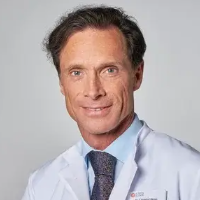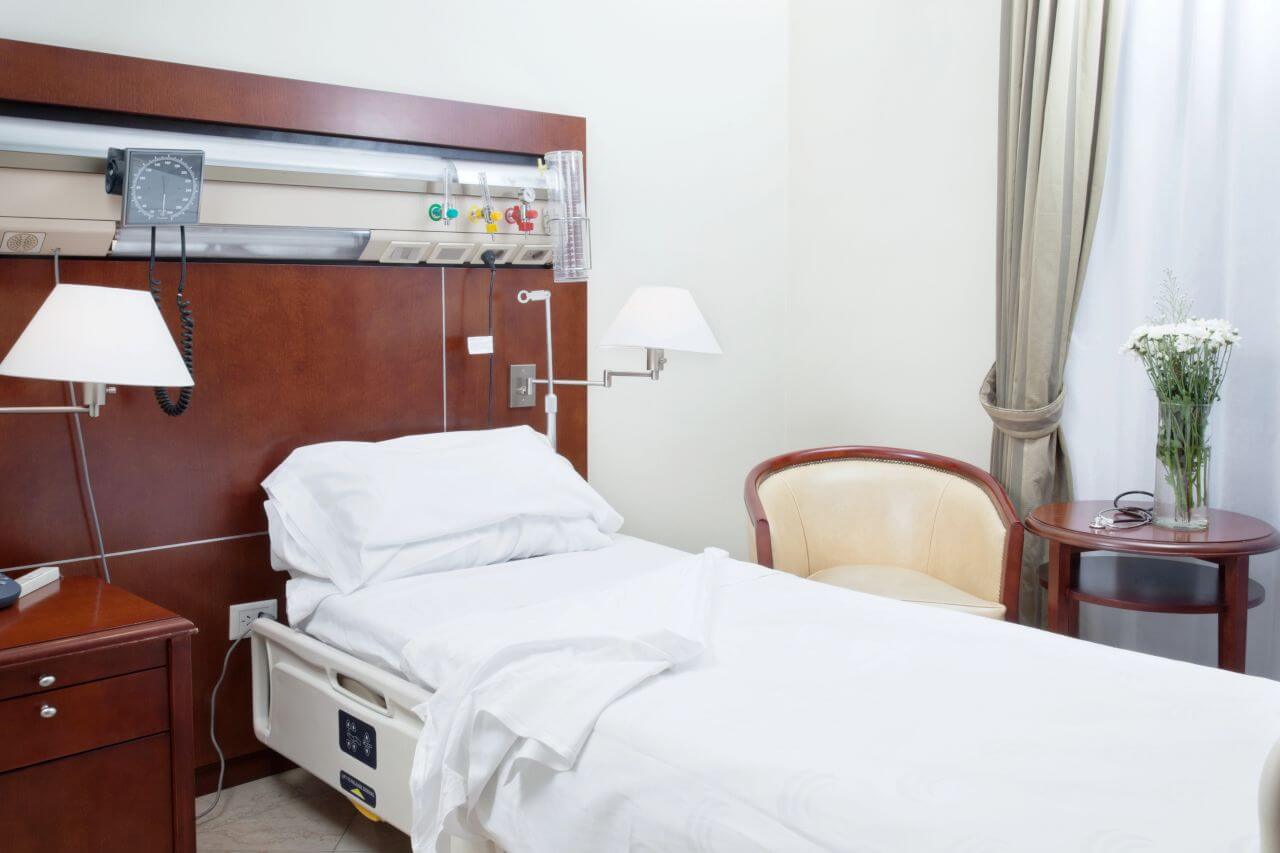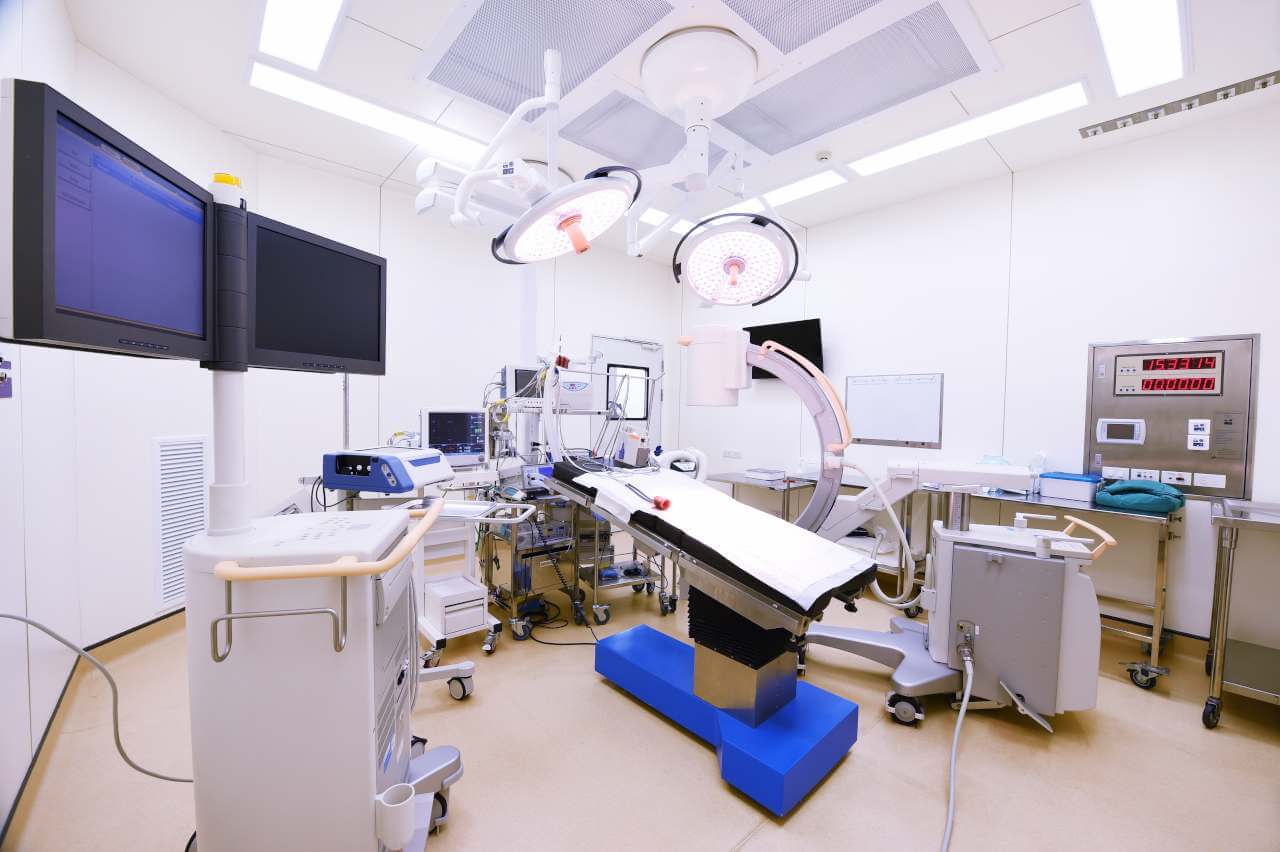
The program includes:
- Initial presentation in the clinic
- clinical history taking
- review of medical records
- physical examination
- laboratory tests:
- complete blood count
- biochemical analysis of blood
- thyroid function test (TSH-basal, fT3, fT4)
- mineral metabolism analysis (Na, K, Ca, Mg)
- lipid metabolism (HDL/LDL, cholesterol, triglycerides,
Lip(a), homocysteine) - iron content (ferritin, iron)
- blood coagulation analysis (aPTT, PT, INR)
- metabolic status (uric acid, total glucose, HbA1c)
- inflammatory parameters (CRP, ESR)
- cardiovascular disease risk markers
- vascular system assessment
- lung function test (Spirometry)
- resting and exercise ECG
- vessel elasticity measurement
- body fat and water examination
- color doppler echocardiography
- color doppler sonography of cerebral vessels
- measurement of arterial blood pressure electrocardiogram
- Holter monitoring (24h)
- preparation according to preoperative standard
- implantation of cardioverter- defibrillator
- symptomatic treatment
- control examinations
- the cost of essential medicines and materials
- nursing services
- full hospital accommodation
- explanation of future recommendations
Required documents
- Medical records
- ECG (if available)
Service
You may also book:
 BookingHealth Price from:
BookingHealth Price from:
About the department
The Department of Cardiology and Internal Medicine at the Schoen Clinic Duesseldorf provides the full range of medical services in the areas of its specialization. The primary clinical focus is the diagnosis and treatment of heart diseases, such as arrhythmias, valvular heart diseases, coronary heart diseases, and myocardial infarction. The department's cardiologists also provide medical care to adult patients with congenital and acquired heart defects. The department is recognized as one of the best in Germany for interventional catheter-based procedures to close the left atrial appendage with an occluder. Whenever required, vascular surgeons and angiology specialists may be involved in the treatment of patients with heart pathologies. The department also offers modern diagnostic and therapeutic procedures for patients with gastrointestinal diseases, acute and chronic lung diseases, infectious pathologies, thyroid diseases, kidney pathologies, and arterial hypertension. The medical facility houses a Dialysis Unit with four beds, where renal replacement therapy is provided to patients with acute and chronic kidney failure. Highly qualified doctors take care of the patients, who have at their disposal the necessary technical resources and effective therapeutic techniques to provide high-quality medical care. The Head Physician of the department is Dr. med. Christof Wald.
The department's cardiologists specialize in conservative and interventional catheter-based treatment of heart diseases. Doctors quite often admit patients with arrhythmias. The department has gained vast experience in treating patients with tachycardia (fast heart rate) and bradycardia (low heart rate). If arrhythmia is suspected, the department's specialists perform a comprehensive diagnostic examination, including electrocardiography, Holter monitoring, stress testing, electrophysiological studies, and cardiac CT and/or MRI. The obtained diagnostic data allow for the accurate determination of the type of arrhythmia and the prescription of effective treatment for the patient. Arrhythmias can be mostly brought under control with drug therapy. To treat tachycardia, the department also successfully performs modern catheter-based procedures such as electrical cardioversion, catheter ablation (radiofrequency ablation or cryoablation), and the placement of implantable cardioverter defibrillators or pacemakers. The optimal treatment is prescribed on an individual basis after a thorough analysis of the patient's clinical data.
The department's cardiologists also specialize in the treatment of coronary artery disease (CAD), one of the most common heart pathologies worldwide. CAD involves the impairment of myocardial blood supply due to damage and narrowing of the coronary arteries. This pathology may lead to life-threatening conditions such as heart failure or myocardial infarction. The department's specialists have all the necessary capabilities to successfully deal with coronary artery disease. The first-line treatment involves conservative therapy with drugs, diet therapy, regular physical exercise, smoking cessation, and avoiding alcohol consumption. The second-line treatment is percutaneous transluminal coronary angioplasty, during which cardiologists use catheter-based techniques and a special balloon to widen the coronary artery and implant a special stent to prevent recurrent stenosis.
The department also houses a Chest Pain Unit, where specialists provide round-the-clock medical care for patients with acute coronary syndrome. All therapeutic options are available here, ranging from drug therapy to urgent catheter-based interventions and primary cardiac rehabilitation to maximize the patient's health and ability to work after a myocardial infarction.
The medical facility also admits patients with various internal diseases, with a special focus on treating pathologies of the digestive system. The department effectively treats stomach and duodenal ulcers, bowel polyps, gastroesophageal reflux disease, hepatitis, stomach tumors, colon tumors, pancreatitis, and other conditions. In most cases, patients with these diseases receive drug therapy with pills, infusions, and injections. The department also has an Endoscopy Unit, in which specialists perform diagnostic and therapeutic endoscopic procedures on the gastrointestinal organs. The most popular procedures are gastroscopy, colonoscopy, polypectomy, mucosectomy, balloon dilatation, argon plasma coagulation, and hemostasis.
The department specializes in the diagnostics and treatment of the following diseases:
- Cardiology
- Arrhythmias: tachycardias and bradycardias
- Coronary artery disease
- Acute coronary syndrome
- Valvular heart diseases
- Congenital and acquired heart defects in adults
- Internal medicine
- Diseases of the gastrointestinal organs, liver, gallbladder, and pancreas
- Stomach and duodenal ulcers
- Bowel polyps
- Stomach and colon malignancies
- Gastroesophageal reflux disease
- Gallstone disease
- Hepatitis
- Pancreatitis
- Thyroid diseases
- Thyroid cancer
- Goiter (enlarged thyroid gland)
- Kidney diseases
- Lung diseases
- Arterial hypertension
- Diseases of the gastrointestinal organs, liver, gallbladder, and pancreas
- Other diseases
The department's range of therapeutic options includes:
- Drug therapy
- Interventional catheter-based treatment of heart diseases
- Electrocardioversion
- Catheter ablation: radiofrequency ablation and cryoablation
- Placement of implantable cardioverter defibrillators
- Implantation of pacemakers
- Percutaneous transluminal coronary angioplasty with stent implantation
- Left atrial appendage closure with an occluder
- Endoscopic treatment of gastroenterological diseases
- Gastroscopy
- Colonoscopy
- Polypectomy
- Mucosectomy
- Balloon dilatation
- Argon plasma coagulation
- Endoscopic hemostasis
- Electrohydraulic lithotripsy for gallstone disease
- Dialysis (renal replacement therapy) for kidney diseases
- Radioiodine therapy for thyroid diseases
- Other treatment methods
Curriculum vitae
Professional Career
- Since 2021 Head Physician, Department of Cardiology and Internal Medicine, Schoen Clinic Duesseldorf.
- Since 2015 Medical Director of the Cherubine Willimann Stiftung Group of Clinics.
- Since 2011 Head Physician, Department of Cardiology and Internal Medicine, Schoen Clinic Duesseldorf.
- 2008 - 2011 Senior Physician, Department of Cardiology and Angiology, St. Elisabeth Hospital in Essen.
- 2004 - 2008 Managing Senior Physician, Department of Cardiology, Catholic Hospital Essen-Nord-West.
- 2000 - 2003 Physician, and then Senior Physician, Department of Cardiology and Internal Medicine.
Professional Certification and Qualifications
- Board certification in Internal Medicine.
- Board certification in Cardiology.
- Additional qualifications in Special Intensive Care for Internal Diseases.
Photo of the doctor: (c) Schön Klinik Düsseldorf
About hospital
According to the reputable Focus magazine, the Schoen Clinic Duesseldorf is one of the top medical facilities in North Rhine-Westphalia and is also one of the best Spinal Surgery Centers in Germany.
The Schoen Clinic Duesseldorf is recognized as a leading medical facility that provides high-quality medical care with an emphasis on a humane attitude and understanding of each patient's individual needs. The clinic offers a range of medical specialties, including orthopedics, trauma surgery, spinal surgery, otolaryngology, cardiology, internal medicine, angiology, and vascular surgery.
Patients' health is in the safe hands of a highly qualified team of more than 590 physicians and nurses. The clinic treats more than 48,000 patients annually, which is a testament to the high level of patient satisfaction with medical services.
The clinic has a comfortable infrastructure, including modern diagnostic rooms, laboratories, an emergency medical care unit, therapeutic rooms, and operating rooms adapted for low-traumatic surgical interventions. It is worth noting that the clinic has a Center for Arthroplasty that is certified according to the EndoCert standards by the German Society for Orthopedics and Orthopedic Surgery (DGOOC). This is the most prestigious certificate in this medical field in Germany.
The Schoen Clinic Duesseldorf provides comprehensive medical care in accordance with international clinical standards, always taking into account the individual needs and wishes of each patient. The doctors strive to provide patients with the most effective and sparing treatment possible using the very latest therapeutic techniques.
Photo: (с) depositphotos
Accommodation in hospital
Patients rooms
Patients of the Schoen Clinic Duesseldorf live in comfortable single and double rooms designed in light colors. The rooms are furnished with a comfortable, automatically adjustable bed with an orthopedic mattress, a wardrobe, a table and chair, a TV set, a telephone, a mini-fridge, and a safe. Each patient room has an ensuite bathroom with a shower and toilet. The bathroom has changeable towels, a hairdryer, toiletries, and a bathrobe.
Meals and Menus
The patient and his accompanying person are offered three meals a day: breakfast, lunch, and dinner. The patient and his accompanying person have a choice of three set menus daily.
If, for some reason, you do not eat all the foods, you will be offered an individual menu. Please inform the medical staff about your dietary preferences prior to treatment.
Further details
Standard rooms include:
![]() Toilet
Toilet
![]() Shower
Shower
![]() Wi-Fi
Wi-Fi
![]() TV
TV
Accompanying person
Your accompanying person may stay with you in your patient room or at the hotel of your choice during the inpatient program.
Hotel
You may stay at the hotel of your choice during the outpatient program. Our managers will support you for selecting the best option.





